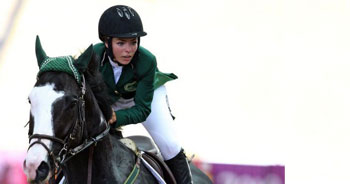Olympic Changers

The London Olympics will be the first games to include women as well as men from every competing nation, including Brunei, Qatar and Saudi Arabia.
The two Saudi women participants though they have not qualified have received special invitations from the International Olympics Committee (IOC), (politics trumps performance) who hope that they will put up a reasonable show. It will be rather interesting if either of them do brilliantly despite not qualifying? At least this may take the IOC’s mind off trying to disqualify women as women who have a habit of performing too well (testosterone trumps performance). (See gendercentric newsflash Olympic Confusion : Gender & the IOC, 02 July)
It had earlier been speculated that the London Olympics would welcome the dashing Saudi equestrienne – Dalma Malhas- who won bronze at the 2010 Singapore Youth Olympics to which she was not nominated by her country but specially invited by the IOC. But it seems that her horse is sick. This is a case of horse trumps rider, though normally as noted (02 July) horses enable their riders to transcend gender barriers.
The Olympic Games have often provided the forum for political and human rights statements. The question here is what happens after the games. Will the participation of Wodjan Ali Seraj Abdulrahim Shahrkhani (judo) and Sarah Attar (athletics) finally level the playing field for all Saudi women and girls who are banned from playing sports in school, and denied access to most sports facilities? Sarah Attar from her training base in the States has already said that she hopes to ‘make some really big strides for women over there’.
Currently Saudi Arabia stands at 135 out of 146 countries on the Gender Development Index (2011) http://genderindex.org/country/saudi-arabia . Women have been granted theoretical rights to vote in future municipal elections, and also to become eligible for driving licenses a mere four years from now. That having been said Saudi Arabia has beaten the USA to the ratification of the UN Convention on the Elimination of All Forms of Discrimination against Women (CEDAW), by ratifying in 2000. The USA is still pondering the ratification of this most dangerous of international conventions but perhaps the President’s recent support for gay marriage is a sign of better things to come…but only if he wins of course. Check out some US objections to the ‘international bill of rights for women’:
http://www.womensissues.about.com/od/feminismequalrights/a/CEDAWUS.htm
And best of luck to Wodjan and Sarah, as game-changers if not medal winners.